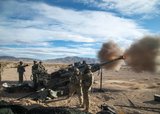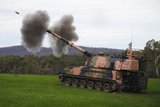Israel ramps up Arrow-4 development following Iranian attack
Arrow-4 would replace the operational Arrow-2 and would be cheaper to operate that the Arrow-3 (pictured), according to sources in Israel. (Photo: Israeli MoD/US MDA)
Israel’s Ministry of Defense (MoD) has decided to accelerate the development of the Arrow-4 ballistic missile interceptor following Iran’s attack on the country on 13 April. The Ministry has been in talks with the US Missile Defense Agency (MDA) to coordinate the accelerated effort.
The decision was based on the small number of Iranian ballistic missiles that penetrated Israel’s multi-layered air defence system during the recent attack.
Brig. General (Res.) Zvika Haimovich, who was commander of the Israel Air Defense Forces until 2018, told Shephard that the Arrow-4 would introduce new capabilities to the force.
“This interceptor is designed to
Already have an account? Log in
Want to keep reading this article?
More from Land Warfare
-
![US Army plans Q2 prototype proposal request for its Mobile Tactical Cannon programme]()
US Army plans Q2 prototype proposal request for its Mobile Tactical Cannon programme
The US Army is seeking a mature 155mm, wheeled, self-propelled capability to replace the towed M777 howitzer in the Stryker, Mobile and Infantry Brigade Combat Teams as it targets a potential 498-unit acquisition goal.
-
![British Army’s Project Stokes 120mm mortar bids due in March 2026]()
British Army’s Project Stokes 120mm mortar bids due in March 2026
Project Stokes could see a new 120mm mortar capability enter British service, with domestic production and international partnerships central to competing bids.
-
![MKJ Warrior Series — The Nett Warrior Qualified Connector for Today’s Soldier Systems]()
MKJ Warrior Series — The Nett Warrior Qualified Connector for Today’s Soldier Systems
ITT Cannon’s MKJ Warrior connectors are designed for the harshest environments, delivering mission critical comms, navigation and USB data/power.
-
![Active vehicle protection comes to the forefront as Trophy and Iron Fist secure contracts]()
Active vehicle protection comes to the forefront as Trophy and Iron Fist secure contracts
Experience on the battlefield is accelerating the adoption of active protection systems as technologies continue to evolve to reflect shifting global defence needs.
-
![World Defense Show 2026: Hanwha increases Middle East presence and reveals Tigon 6x6 sale]()
World Defense Show 2026: Hanwha increases Middle East presence and reveals Tigon 6x6 sale
Shephard sat down with Hanwha Middle East and Africa president Sung Il at World Defense Show 2026 to hear about the company’s plans for the region and how it plans to use local industry success to win deals.

























